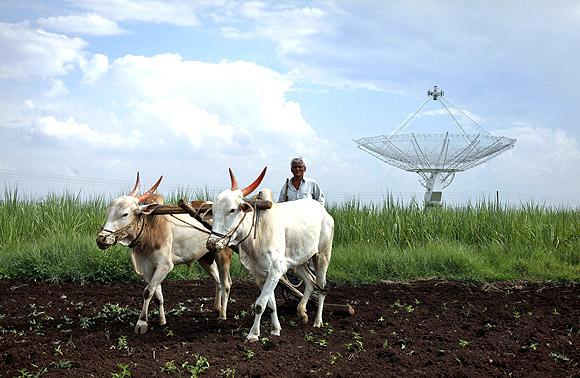
'When England colonised us they took on the White man's burden. They took upon the burden to educate us. Civil society is doing the same thing by the Right to Food...' says Professor Pradeep Bhargava.
Till two of his cycles were stolen from outside his house in a nearby village, Professor Pradeep Bhargava used to cycle to work every day.
"Whoever stole it must have sold it for 500 or so," he smiles, taking a small round on an employee's borrowed cycle at the GB Pant Institute of Social Science in Allahabad. A large statue of Govind Ballabh Pant stands in the front garden, the legendary freedom fighter and first chief minister of Uttar Pradesh, from whom the institute gets its name. On the campus is also a tree planted by another Indian legend, Verghese Kurien, the founder of India's most famous cooperative.
Serving a second tenure as director of the institute, the Jaipur native has researched and written about poverty, vulnerability and has studied civil society's response to various problems.
An advisor to the commissioners of the Supreme Court in the People's Union of Civil Liberties case on the Right to Food, Professor Bhargava has also been a mid-career fellow at the Woodrow Wilson School, Princeton University and a Visiting Fellow at the Institute of Development Studies, University of Sussex.
He spoke to Rediff.com's Archana Masih about the food bill which he feels is not pro-people and discusses how the abandoning of traditional food systems has lead to disastrous consequences in India.
After big ticket programmes like the RTI, NREGA, Right to Education... what impact is the Food Security Bill going to have?
I think it's going to be disastrous.
All the food grain that is grown in the country leaves the villages and goes into the market or to the FCI (Food Corporation of India) godowns. It gets parked in one of these two places.
The problem is that the ownership of this grain is either with the market or with the Government of India, not even the state governments. Therefore, people lose control over their food.
The richest states in the country are Punjab, Haryana, Gujarat, Maharashtra, Tamil Nadu, Kerala and Delhi.
Haryana and Punjab are the producers of grain, the remaining states produce 40 to 90 per cent less than their food grain requirement. The deficit food is imported from other states -- basically from Punjab, Haryana and UP or wherever there is a surplus.
The only other major deficit state is Bihar among the BIMARU states (Bihar, Madhya Pradesh, Rajasthan, Uttar Pradesh and later Orissa).
From last five year's data, Rajasthan, MP produce enough for their own consumption. Even district Kalahandi (one of India's poorest districts which has seen one of the highest starvation deaths) in the last five years has produced more than its requirements.
But the problem is that the food that is grown in the area is taken away by the market and by the state. It does come back through the public distribution system, but people lose control over the food that theY grow.
Also going back to the rich states -- Kerala imports 90 percent of its (food) requirements. Can you imagine! They have passed a bill in the assembly that no more paddy fields will be shifted to other cultivation.
Their human development report very proudly indicates that it is the most literate state in the country and they thank the PDS for making this possible.
It is states like UP and others -- not only Punjab and Haryana -- that are feeding these rich, food-deficit states.
Maharashtra is into cash crops like cotton and sugarcane. So is Gujarat. In Tamil Nadu, one lakh (100,000) hectares of land is now not cultivated. Other states are producing food for these rich states.
This Food Security Bill will first feed the rich states that are deficit because they grow cash crops. They are growing rich by growing cash crops while other states have to feed them.
Please ...
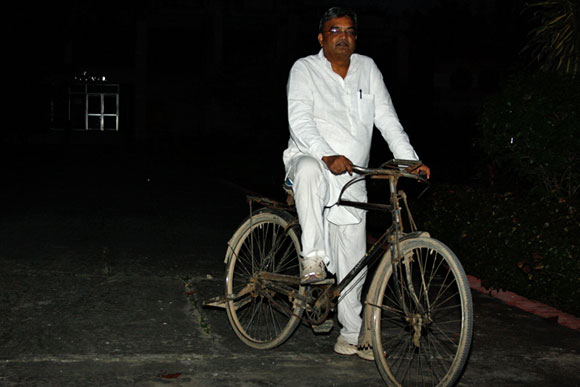
My plea is that the food that is grown in the village, the first call on that food, should be of the villagers.
Just because you want the state to be duty-bound, you want to bring an Act to make it possible. This is utter nonsense.
Civil society organisations are well meaning and I have also been a part of it. When I look back, I feel civil society has been thinking big -- (in terms of) a big Act. An Act that empowers the Government of India to collect food and then distribute it.
This is patronage economy, patronage politics that comes into play by well meaning civil society organisations who basically want a Right to Food for the people. But it is coming through an Act which I think is not pro-people because people lose control of their produce.
They (civil society groups) argue that they are pushing for decentralised procurement, decentralised storage and distribution, but it is a question of ownership.
Civil society organisations and political leaders don't have trust in the people to manage their own resources. There must be very few villages in this country that will be food deficit.
Even if a farmer has a small piece of land he will grow his own food and not like it from other sources.
Your basic premise is that food should be managed locally?
Not only managed locally, it is a question of ownership.
Who owns the food? The state or people's organisation/ It is about ownership, not management.
Are you saying that at the village level, it is up to the gram panchayat to see that everybody has food?
The other way of looking at it is 'decentralism' -- where people have the power.
You are saying that the state has the power and it is decentralising (giving away power); (but) when people have the power -- that is 'decentralism'. They will decide what to produce, how much to produce and how to distribute it.
Please ...
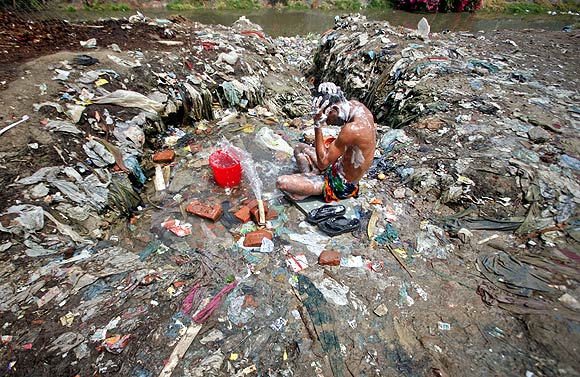
How does the Right to Food bill compare with existing food-related schemes like the Integrated Child Development Scheme, Midday Meal Scheme, PDS?
When it comes as an Act, it will be a legal binding on the State.
What the State is doing is making a lifecycle approach. Even before the birth of the child, then you are feeding the pregnant mother, you are feeding the infant through ICDS, then you're feeding the children, then feeding adolescent girls at ICDS centres, you get PDS when you are adults, then do NREGA and get work, then you become old and get a pension.
If you look at it from a very philanthropic sense, you're doing good for the people, but look at what kind of a society you're imagining where everything you can get from the State. This is again the sad part of these kind of schemes.
The other argument is that the government spends too much on populist schemes. Are we becoming an excessively welfare State?
You have to be careful in saying this because you need to have some parameters to say something is excessive.
There is a dependency syndrome. The problem again is that if it was a people's organisation doing it at the local level, then it would not be dependency because people would be managing it and feel responsible towards it.
Otherwise, it becomes a State-sponsored scheme. If the State does it, then no one is responsible for it or everyone is responsible for it. That is the difference.
I am not saying that you do away with ICDS or PDS -- but who does it is important? Who owns it is important.
(Government) schemes are not carried out with sincerity and dignity because food is coming free from the Government of India and it has to be distributed, but if people were to own it, it becomes different.
Do you think schemes have become captive to the poverty line, instead of looking at it with a fresh approach?
Who decides the poverty line? It is the State that defines the poverty line and a very strong State at that.
It does not have trust in the agency of the people. By agency of the people I simply mean the ability of the people to think and act on their own.
If people were to do it themselves, they would know who does not have food in their home this week. So the entire game changes.
The State can only give absolute measures of poverty, it cannot measure relative poverty.
In that case, what should the Food Bill be like?
One will have to think of a model which is very different from this. It requires an absolutely fresh approach. That the panchayat itself forms some kind of a group or society or organisation at the local level which finds what is grown in the village and what is the food deficit.
If there is a food deficit, they get the food from outside and if it's not they send the surplus out or sell it to the FCI (Food Corporation of India). I'm not saying to dismantle the FCI system because we need a buffer stock for famine, drought etc.
So it is do-able, but one has to think of a model. The only model that is floating around is that the Government of India wants the food.
Please ...
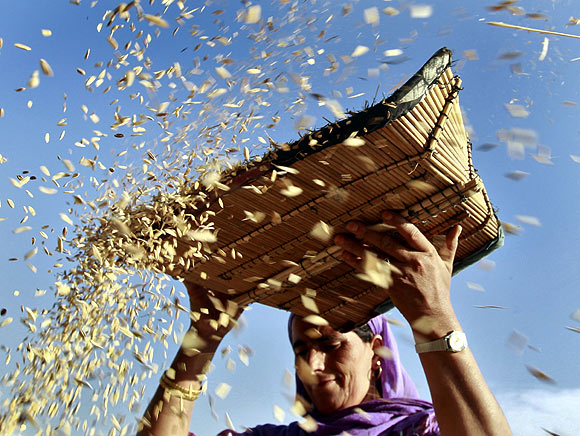
Two decades ago when India set out on the road to liberalisation, it was believed that growth will trickle down to the villages, but that hasn't really happened.
Does growth really trickle down?
Not all growth trickles down. Depends on growth in which sector. Growth in agriculture trickles down the most, but that is where we have always lacked and haven't crossed the benchmark.
In spite of economic growth where prosperity has reached a section of the people, there are others for whom not much has changed -- where children still die of hunger, diarrohea etc. Why do India's social indicators still remain poor?
Social indicators are drawn on the NFHS (National Family Health System) data which is based on an average based on samples in US, Australia, Brazil, India etc. On those samples they have done these markers for malnutrition.
The problem is that the average they've taken on this line of malnutrition is disputable.
There are pockets of malnutrition (in India), it is not all pervasive. The health system in these pockets is weak. If the food availability in the country is around what the minimum requirement of food is, then why is there so much malnutrition?
It is because of poor health and sanitation services. The food that is eaten does not get absorbed because of poor sanitation.
That is one aspect that critics of the food bill say -- that it does not take into account the availability of clean water and sanitation.
Again, you are making the Government of India responsible for keeping the village clean. Then that will lead to some directive coming from the GoI on how to keep your village clean! You have to make people responsible.
Number one, the social indicators are disputable and there is a quicker way of improving the indicators by readymade health systems. The UN agencies have been working here for 50, 60 years, then why are these indicators becoming worse? Even if you believe in these indicators you have to ask what has gone wrong.
We are a civilisation that is thousands of years old, were we undernourished all these years? How could we have survived then? These are very important questions.
Food is about nutrition, but it is also about culture. Each place grows what it eats.
Take the classic case of Punjab where 1/3 of the area was under coarse seeds -- which are nutritive cereals. Almost the entire area is now substituted by wheat and paddy. Pesticides, fertilisers and so on were brought in and now they have the highest rate of cancer. The robust, majestic, people of Punjab have to face this.
What is grown in your surrounding is best for you. We have given away that because we don't want to encourage coarse cereals that require very little water and perhaps don't need much fertilisers.
In this race for modernity we have done away with our systems of food or health.
In Kerala they don't celebrate Vishu with homegrown paddy anymore which was part of their culture. (Kerala imports most of its food grain from other states.) We are doing away with all this in our march into modernity.
Please ...
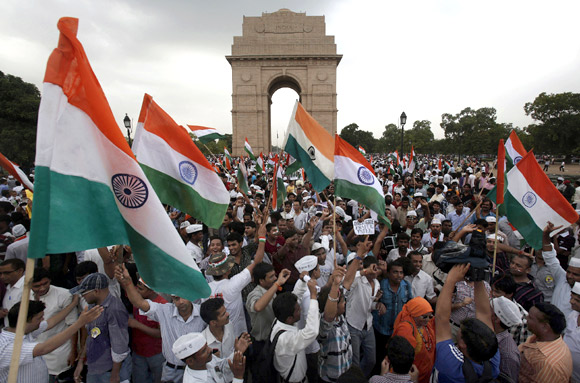
One reason for the farmer's misfortune has been the shift to cash crops from traditionally grown crops in their fields.
Marginal farmers in UP are not committing suicide. Farmers in Maharashtra commit suicide because they are unable to repay their loans. They are not growing food grain, but want to grow cotton which is most risky.
Marginal farmers don't commit suicide, if they don't find work, they migrate.
Migration is another crisis. Where farmers are leaving villages to work as labourers in construction sites.
It is a crisis because the state is not investing as it should in the agriculture of the small farmer. The State thinks of big things -- big dams, big electricity projects etc, whereas very little work has been done in dry farming.
Even if it has been done, then it is weak. Or the kind of science they've put into it is very modern. It is the traditional variety that needs to be worked upon.
When England colonised us they took on the White man's burden. They thought we were the most unscientific people. They took upon the burden to educate us, teach us English and so on. Civil society is doing the same thing -- by the Right to Food...
How is civil society an extension of the White man's burden?
The World Bank said India is under-developed and decided to give foreign aid and with this came in the notion of poverty. They took on the White man's burden and everyone accepted it. We also accepted it.
The only person who opposed this path was Mahatma Gandhi. He said there were other ways, even frugal ways for development.
The State was sold to modernity. The only comparison that you do is with the United States. We are getting fully integrated into the system and when you are fully integrated into the system some people get left behind.
In the process a great divide happens and this cannot continue for a very long time because then there will be revolution.
So civil society comes and fits into the system very well and takes on the burden to lift the rest of the people -- not make them modern -- but to make them live.
Please ...
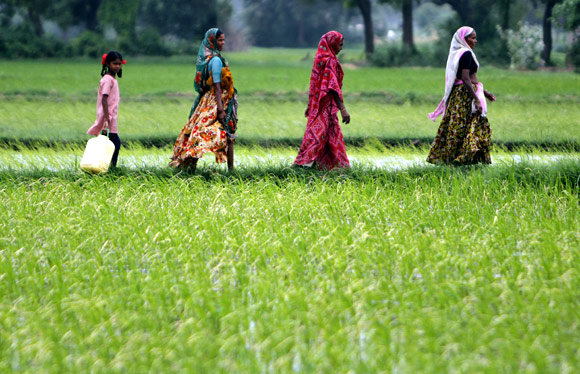
In India the State is such a big monolith that since Independence all big ticket measures are taken and executed by the State machinery.
You say the State should trust its people to manage their own resources. Do you think we are ready for that, since these tasks have always been done by the State?
These thoughts are what are called the White man's burden. That it is only we who can do things for the poor. The poor can't do anything for themselves. We need to see what they can do and how they can be supported.
The RBI (Reserve Bank of India) support that goes to the FCI (Food Corporation of India) -- which is direct support and does not go into the budget of the Government of India. That RBI kind of support can also be extended to the village panchayat.
The best way to do it perhaps is to have a food for work in NREGA (National Rural Employment Guarantee Scheme). There can be a self selection and people who need food can take it.
What you are saying is that we are looking at the big ticket ideas while the smaller farmer is not getting what he needs for his land?
Maybe he doesn't need government support. The entire notion of living frugally has disappeared. Everyone wants education. What does education mean?
Is the farmer not educated in agricultural practices that he has learnt it through generations? Is that not education?
In modern terms it is not, but at least we people think that is education. Learning from a book does not give you agricultural skills, it may give you marketable skills.
We have started equating frugality with poverty.